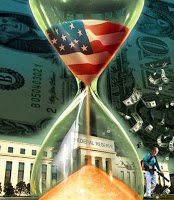 |
| Dees Illustration |
Madison Ruppert, Contributing Writer
Activist Post
The debt ceiling issue has dominated headlines for weeks, yet even when a compromise is made and Americans are forced to sign on to more bankster debt, the Moody’s rating agency is warning of a ratings cut.
Moody’s is not presenting any solutions or ways to avoid this downgrade, instead Steve Hess, a senior credit officer at Moody’s New York told Bloomberg, “We do think more needs to be done to ensure a reduction in the debt to GDP ratio, for example, going forward.”
That is like being inside of a plane hurtling towards the earth and saying, “Well, I think we should probably start flying away from the ground if we don’t want to die.” It is so painfully obvious that stating such is a bit ridiculous. Obviously something needs to be done and signing on to more debt without making significant cuts is not going to do it.
However, Moody’s, like most of the other corrupt financial institutions of the world, is likely referring to austerity measures that would economically rape the people while keeping the cash flow for defense contractors and banks.
Hess is claiming that Moody’s could make a decision on the United States’ credit rating in the next two years or even “considerably sooner.”
J.P. Morgan & Chase has jumped on the Moody’s bandwagon, claiming that a rating downgrade would increase American borrowing costs by roughly $100 billion per fiscal year.
Another Wall Street ratings/financial research house, Standard & Poor’s, or S&P, has told Washington that any cuts totaling less than $4 trillion will result in a downgrade from America’s current AAA rating.
The insanity lies in the reliance on the same old failed monetary and financial systems. Why does our government continue to insist on issuing a debt-based currency that literally subjugates our entire nation under offshore banking cartels? Why is no one pointing to the fact that we could ameliorate a great deal of our problems by issuing a debt-free currency outside of the private Federal Reserve cartel and their buddies in the World Bank and IMF?
The sad fact is that the current compromise makes no significant changes whatsoever. The agreement was passed in the Senate with a 74-26 margin and results in the debt ceiling being raised until 2013. It also threatens “automatic spending cuts” in order to attain the goal of $2.4 trillion in spending cuts over the next decade.
You read that right, the deal provides for slightly more than one half of the cuts required by S&P in order to keep our rating and does so over a 10 year period. That’s $0.24 trillion per year in spending cuts.
Despite all of these dark portents, some say that the United States will still be the world’s first choice in debt and currency investment.
A senior vice president and overseer of about $50 billion in assets at USAA Investment Management Company, Matthew Freund, claims that even if we are downgraded, “Treasuries are going to be seen as the safe haven.” The fact that the U.S. dollar still represents about 60.7% of the world’s currency reserve helps back up this conjecture. The fall of the value of the dollar seems to be completely ignored in this equation.
In response to these continued statements from ratings houses, futures in the Dow, S&P, and NASDAQ dropped today by 30 points, 4.8 points, and 9 points respectively. Other stocks in the United States fell as well with the S&P down for the sixth day in a row.
Meanwhile, other nations’ credit ratings don’t seem to be as generous as Moody’s and S&P when it comes to waiting on the rating downgrade.
The Chinese rating agency Dagong Global Credit Rating Company lowered the United States for the second time to the rating of A from A+ last November.
The political theatrics surrounding the debt ceiling debate are seemingly behind this move, as Dagong’s Chairman Guan Jianzhong revealed.
In a statement to CNN Jianzhong said that, “The squabbling between the two political parties on raising the U.S. debt ceiling reflected and irreversible trend in the United States’ declining ability to repay its debts. The two parties acted in a very irresponsible way and their actions greatly exposed the negative impact of the U.S. political system on its economic fundamentals. Our downgrade simply reflects reality. Our rating didn’t cause China to lose any money – it was inappropriately high ratings for the U.S. by Western agencies that had led China to make risky investments in U.S. debt.”
Regardless of these clear warnings from across the globe, some seem to be holding on to the idea that the United States is untouchable.
Jeff Cox of CNBC claims that because “bond auctions have been solid if not spectacular as of late” a credit downgrade would not negatively impact interest rates. He offers little support this conjecture other than the global debt crisis threatening every economy which he claims is leading world central banks to keep putting their money into U.S. bonds.
Others, like president and CEO of Waddell & Associates David Waddell, also claim that “a downgrade would bark loudly and bite softly” due to the fact that the debt crisis is a wide spread problem and it is not as if there is a plethora of reliable economies to invest in.
I sincerely hope that Waddell, Cox, and others are correct. However, I think it might be a bit early to claim that it will be smooth sailing regardless of any credit downgrades.
linkwithin_text=’Related Articles:’


Be the first to comment on "Despite raising the debt ceiling, Moody’s and S&P warn of downgrade"